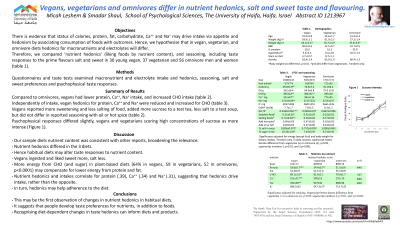Back

Objectives: Nutrient hedonics (liking foods by nutrient content), and seasoning, including taste responses to the prime flavours salt and sweet, were compared in vegan, vegetarian and omnivore diets.
Methods: Questionnaires examined macronutrient and electrolyte intake and hedonics and seasoning: taste tests for salt and sweet preference: psychophysical taste responses for salt and sweet.
Results: Compared to omnivores, vegans had lower protein, Ca ++ , Na + intake, and increased CHO intake. Hedonics for energy, fat, protein, Ca ++ , Na + and K + were reduced. Psychophysical responses to NaCl and sucrose also differed slightly, vegans and vegetarians scoring high concentrations of sucrose as more intense. Vegans reported more sweetening and less salting of food, added more sucrose to a test tea, less salt to a test soup, but did not differ in seasoning with fat/oil or hot spice.
Conclusions: Habitual vegan, vegetarian and omnivore diets may alter taste responses to nutrient content and salt and sweet, the latter more pronounced in vegan and vegetarian women. Recognising diet-dependent changes in taste hedonics could help plan diets and products.
Funding Sources: Israel Science Foundation (902/ 0-2 and 7481478) and the Israel Ministry of Health (1043-3-00000)
Dietary Patterns
(PO08-29-22) Vegans, Vegetarians and Omnivores Differ in Nutrient Hedonics, Salt and Sweet Taste and Flavouring


Micah Leshem, PhD
– Emeritus Professor, University of Haifa, Haifa, Hefa, Israel- SS
Smadar Shaul
– Tel Aviv University
Presenting Author(s)
Co-Author(s)
Disclosure(s):
Micah Leshem, PhD: No relevant financial relationship(s) with ineligible companies to disclose.
Objectives: Nutrient hedonics (liking foods by nutrient content), and seasoning, including taste responses to the prime flavours salt and sweet, were compared in vegan, vegetarian and omnivore diets.
Methods: Questionnaires examined macronutrient and electrolyte intake and hedonics and seasoning: taste tests for salt and sweet preference: psychophysical taste responses for salt and sweet.
Results: Compared to omnivores, vegans had lower protein, Ca ++ , Na + intake, and increased CHO intake. Hedonics for energy, fat, protein, Ca ++ , Na + and K + were reduced. Psychophysical responses to NaCl and sucrose also differed slightly, vegans and vegetarians scoring high concentrations of sucrose as more intense. Vegans reported more sweetening and less salting of food, added more sucrose to a test tea, less salt to a test soup, but did not differ in seasoning with fat/oil or hot spice.
Conclusions: Habitual vegan, vegetarian and omnivore diets may alter taste responses to nutrient content and salt and sweet, the latter more pronounced in vegan and vegetarian women. Recognising diet-dependent changes in taste hedonics could help plan diets and products.
Funding Sources: Israel Science Foundation (902/ 0-2 and 7481478) and the Israel Ministry of Health (1043-3-00000)

.png)
